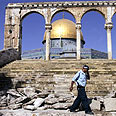
Hundreds of Palestinians thronged two major West Bank checkpoints, trying to reach the key Islamic shrine in Jerusalem, despite tight Israeli restrictions.
Israeli troops turned back many of the West Bank faithful. Only men above the age of 45 and women above the age of 35, who had also obtained special permits, were allowed to enter Jerusalem's al-Aqsa Mosque, the third holiest shrine of Islam, said police spokesman Shmuel Ben-Ruby.
Later Friday, several tens of thousands of Palestinians, many of them Jerusalem residents not affected by the restrictions, participated in the al-Aqsa service, and the crowd dispersed peacefully.
This year, the start of Ramadan, a month of fasting and religious observance, coincided with the Jewish New Year. As customary, Israel imposed a blanket closure on the West Bank during the Jewish holiday, barring virtually all Palestinians from entering Israel.
Hundreds of Israeli police, including Police Commissioner Dudi Cohen, were deployed in streets and alleys in and around Jerusalem's walled Old City where the al-Aqsa Mosque compound is located.
Troops also took up positions at two major West Bank checkpoints, one to the south of Jerusalem and one to the north. The checkpoints are built into Israel's West Bank separation fence, which rings most of Jerusalem to control Palestinian movement into Israel.
At the southern checkpoint, near the biblical town of Bethlehem, hundreds of Palestinians, many of them elderly, pushed up against police lines set up near the separation barrier, in this area a towering wall.
At one point, the crowd pushed through the police line. One woman crawled on her hands and knees, another fell to the ground as people behind her surged forward. Israeli troops shouted at people to get back.
At the northern Qalandiya crossing, near the city of Ramallah, hundreds of people waited to pass. Hamdi Abu Fadi, 44, was turned back because he didn't meet the age requirement. Abu Fadi said he would try to sneak into Jerusalem in another area, in hopes of reaching al-Aqsa.
Prayers performed at the shrine are considered more powerful than worship in another mosque.
Palestinians have long complained that Israel is violating their right to freedom of worship by restricting access to a major shrine. "It's a crime against us all year long, whether during Ramadan or any other month," said Abu Fadi.
Israel says it imposes the restrictions to prevent possible attacks by Palestinian terrorists. Ramadan is a time of heightened religious fervor which security officials fear could increase the motivation for carrying out attacks.
Fatah-Hamas rift felt throughout territories
Jerusalem District Police Commander Major General Ilan Franco told Ynet, "The prayer ended as we predicted. We allowed the freedom of religious worship to take place at the Western Wall and Temple Mount. During the sermon at the Temple Mount they only referred to the month of Ramadan and nothing else. Our alert level will be similar next week, on the eve of Yom Kippur."
The rift between rival Palestinian groups Fatah and Hamas and between the West Bank and the Gaza Strip is deepening the month of Ramadan, which began Thursday.
Jamal Bawatneh, religious affairs minister in the Abbas-appointed government based in the West Bank, has warned that any imam or preacher "promoting political, personal or partisan ideas will be sacked or replaced".
Placing advertisements in newspapers, the Palestinian civil service is looking to recruit "qualified staff" to fill vacant preaching jobs. Bawatneh said his government had already budgeted for 800 such jobs, AFP reported.
According to Palestinian security forces, most of the mosques in the West Bank are controlled by Hamas.
Ibrahim Abdel Karim, a Gaza resident, told the al-Arabiya network, "Gaza Strip residents are afraid that West Bank residents will celebrate the month of Ramadan according to the dates it is celebrated in some Arab countries, while Gaza residents celebrate according to dates used by other Arab countries, causing a difference of one day between the Strip and the West Bank."
Eventually Palestinians decided to start the holiday on Thursday, both in Gaza and the West Bank.
Efrat Weiss and AFP contributed to this report















